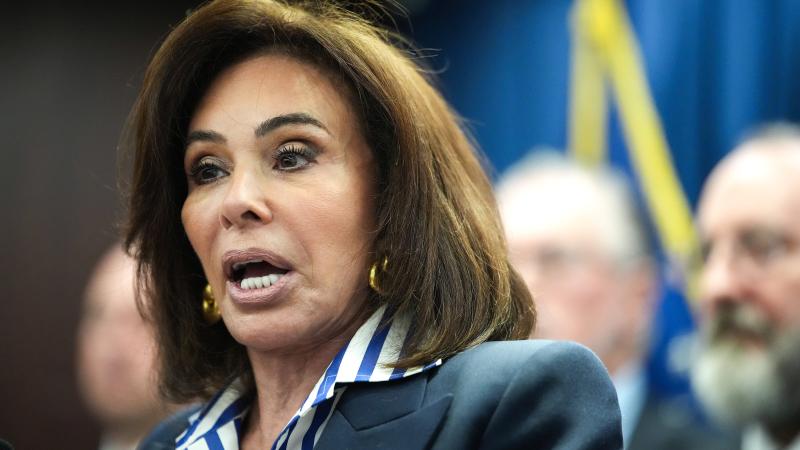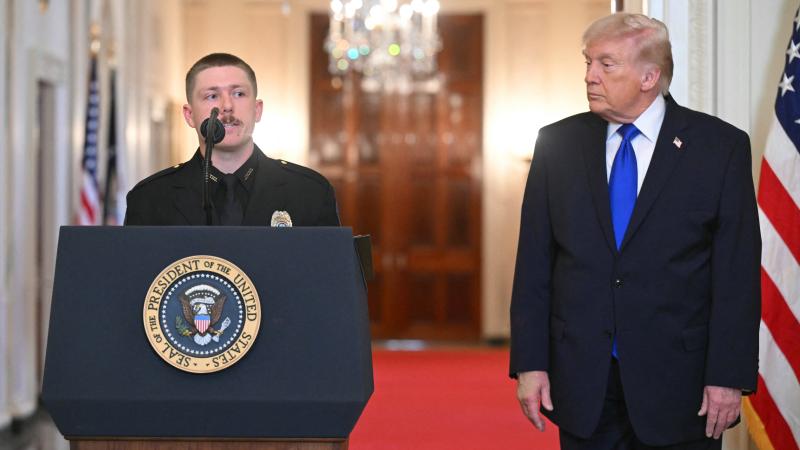Academic freedom group blesses academic boycotts in 'context' of Israel war, calls GOP 'fascist'
American Association of University Professors undergoes similar evolution as ACLU, which is also losing one of its few remaining free-speech hawks. Former AAUP president says group is "parroting long-discredited" BDS claim, but contemporary accuses him of "incoherent rant."
Three years ago, The New York Times put the ACLU on the defensive with a feature on how an organization known for successfully defending a neo-Nazi march in a Holocaust-survivor suburb had ceded its free-speech absolutism in favor of what critics describe as wokism.
Some high-profile supporters and former leaders are now pointing to the Foundation for Individual Rights in Education (FIRE), which expanded into off-campus advocacy and rebranded with "Expression" a year later, as the ACLU's successor on speech-related issues.
The American Association of University Professors' decision to jettison its 19-year opposition to academic boycotts, on the eve of students and disruptive anti-Israel protests returning to campuses nationwide, is prompting similar scrutiny toward its fidelity to its 109-year-old mission.
Not only did it approve a policy Aug. 9 that says boycotts, which AAUP previously called "inimical to the principle of academic freedom," can be "legitimate tactical responses to conditions that are fundamentally incompatible with the mission of higher education," but its new president implied AAUP formally opposes the Republican presidential ticket for 2024.
The AAUP has released a statement reversing its prior categorical opposition to academic boycotts. This historically momentous shift will shape the response to UC's efforts to regulate speech and academic freedom around Israel/Palestine. https://t.co/YU45CMFZTs
— UC Faculty Assoc. (@uc_faculty) August 14, 2024
Critics and supporters of the change have been battling it out in the pages of The Chronicle of Higher Education for the past week.
Former AAUP President Cary Nelson, a vocal critic of the anti-Israel boycott, divestment and sanction movement and its academic proponents, warned of the consequences of the change in a Chronicle essay Aug. 13.
The new policy means "the right to refuse to write letters of recommendation for highly qualified students who wish to study at Israeli universities, an action that will be defended as only boycotting Israeli institutions," according to Nelson, who led AAUP from 2006 to 2012.
"There will also be dedicated group efforts to criminalize collaborative research projects between faculty in America and Israel, projects that often entail institutional endorsement and support," he predicted, faulting AAUP for "parroting the long-discredited [BDS] claim that it boycotts only institutions, not individuals."
Joan Scott, a member of the academic freedom committee that developed the 2006 report on academic boycotts fleshing out the 2005 opposition statement, accused him of an "incoherent rant against the organization Nelson once capably headed" in an essay Tuesday, which an AAUP spokesperson recommended to Just the News.
"How could this once-careful reader now read the AAUP statement so badly? It is a reading peppered with a series of unfounded apocalyptic speculation," Scott wrote.
"Nelson seems to think that there should be no academic freedom for critics of Israel, that Zionism is a flawless project, and that its critics (Jews among them) are antisemites," the emerita professor at the Institute for Advanced Study said. BDS is "nowhere mentioned in the text," which is simply "a reminder that academic freedom extends to ... the political positions that one takes outside of research and teaching."
"People have politicized the statement," the AAUP spokesperson told Just the News. "It's not calling for any academic boycott" but saying it "can be" legitimate as a response to an institution that has violated academic freedom. He emphasized members have been asking for the revision for years, long before the current Israel-Gaza war.
FIRE issued a statement Aug. 12 reiterating its position that "academic boycotts of a nation’s institutions or scholars cannot be reconciled with academic freedom," without referring to AAUP's changed position.
But it cited the now-rescinded 2005 AAUP statement and the former head of Scott's committee that approved it, Hank Reichman, who once called boycotts "utterly wrongheaded." FIRE twice said its position "has not changed, nor will it," implying FIRE is the new haven for those disillusioned by AAUP's change.
Staff changes may indeed help explain the evolution of both AAUP and ACLU.
A month after AAUP members elected Rutgers anthropologist and "Ceasefire Now" activist Todd Wolfson its president — his slate singled out "the likes of" Florida GOP Gov. Ron DeSantis as AAUP's foes — one of the ACLU's lingering free-speech hawks announced he was leaving.
We see you @EliseStefanik & @virginiafoxx. Attacking public and private higher education while bringing in campaign donations from for-profit higher education. This is despicable. @AAUP @HigherEdLabor @AFTunion https://t.co/ZTnMD2VOTn
— Todd Wolfson (@ProfTWolf) August 16, 2024
National legal director David Cole's Supreme Court victories in recent years include decisions in favor of a cheerleader punished for an off-campus rant and against a New York regulator's efforts to make the National Rifle Association uninsurable. Cole's NRA representation prompted denunciation from its New York affiliate at the time.
Like several ACLU expats who have frowned on the organization's turn away from unpopular speech during the Trump administration, Cole is "old school in a modern era," FIRE wrote of his pending departure in its First Amendment newsletter last month.
FIRE Executive Vice President Nico Perrino told the Times that Cole "falls within the lineage of the free speech advocates at the A.C.L.U. that I greatly admire" despite being on opposite sides of the Creative 303 case on the right to not create a same-sex wedding website.
Cole didn't answer a query on X for his reason for leaving and the ACLU didn't answer a query either. The Times reported he's returning to Georgetown University to teach "but will stay at the A.C.L.U. until his successor is chosen."
When the British Association of University Teachers called for a boycott of Israeli universities as "a contribution to the struggle to end Israel’s occupation, colonization, and system of apartheid" in 2005, AAUP quickly "condemned any such boycotts as prima facie violations of academic freedom," according to its 2006 report.
The same academic freedom committee that wrote that report "unanimously approved" the new policy, according to AAUP's Aug. 12 statement.
The original statement "disregards nuance and is inattentive to context," and "has been controversial, contested, and used to compromise academic freedom," the new policy reads.
When faculty and students are not "free to weigh, assess, and debate the specific circumstances giving rise to calls for systematic academic boycotts" and participate in them, this "contravenes academic freedom," it says while cautioning that boycotts should be "situationally sensitive and consider the full range of alternative tactics."
The policy emphasizes that boycotts should target only institutions of higher education "that themselves violate academic freedom or the fundamental rights upon which academic freedom depends," excluding "political or religious litmus tests" and the targeting of scholars for "ordinary academic practices" such as publishing, lecturing and collaborative research.
Mounting criticism, condemnation & just sheer astonishment ⬇️ over the @AAUP and its recently misguided and ill-advised decision to drop its steadfast 20 year opposition to academic boycott. Good! More is on its way from faculty worldwide! 👏 https://t.co/RGcpJFWGIZ pic.twitter.com/TMYssa43nm
— Miriam F. Elman (@MiriamElman) August 16, 2024
Academic freedom committee chair Rana Jaleel told The Chronicle the new policy was devised "in the context of what’s happening in Gaza and Israel" but that the original always showed "tension" between respecting and denouncing faculty noncooperation.
It was also in tension with AAUP's history of supporting faculty strikes, apartheid-era South Africa divestment and institutional neutrality during the Vietnam War, said Jaleel, a gender and Asian American studies professor at the University of California Davis.
While Jaleel claimed the earlier policy was unclear, Acadia University political scientist Jeffrey Sachs said the AAUP itself doesn't seem to know what the new policy means, in a Chronicle essay Friday.
"Someone is going to be forced to either abandon a boycott they support or be denied a university resource to which they are otherwise entitled" under the new policy's multiple caveats, Sachs wrote.
He cited scenarios that are "not especially far-fetched," such as a BDS-supporting department chair refusing to send a professor's paperwork to a search committee for a fellowship to an Israeli university or an Institutional Review Board rejecting a researcher's application for a project at a university in Florida, "no friend to the mission of higher education" in AAUP's view.
New President Wolfson, who reposted congratulations to Squad member Ilhan Omar on winning her recent Minnesota Democratic primary, confirmed the anti-Florida animus in an incendiary Aug. 9 statement issued in AAUP's name against the GOP presidential ticket, repeatedly calling party leaders "fascists."
Mazel tov to @IlhanMN on winning the #MN05 Democratic primary!
This is a victory for all of our movements for justice, from Minneapolis to Gaza. Support for liberation for all people - no exceptions - is a winning stance. pic.twitter.com/AenZyMaGDs— Jewish Voice for Peace Action (@JvpAction) August 14, 2024
He said J.D. Vance's vice presidential nomination "has brought the decades-long battle to define the future of American higher education to a tipping point" based on the Ohio GOP senator's speech "The Universities Are the Enemy" at the 2021 National Conservatism Conference.
If Vance and "the dark-money funders backing him gain power … they would use fear and misinformation to turn colleges and universities into what the Far Right has for years falsely accused them of being: ideological indoctrination centers," Wolfson wrote, pointing to AAUP's May report "Manufacturing Backlash."
Ignoring former President Donald Trump's repeated statements that he does not support the Heritage Foundation's blueprint for his hoped-for second term, Wolfson said Project 2025 "offers a frightening glimpse into an authoritarian future" that would turn colleges "thought-control factories by stifling ideas, silencing debate, and destroying autonomy."
"We cannot afford to let this happen," he said. "Colleges and universities are the bedrock of American democracy and the engine of social mobility, innovation, and progress. We can't allow fascists to strip it away. Now is the time to fight."
"Wolfson not only officially opposed the Republican ticket as an existential threat to higher education but made defeating such views an objective of the organization," George Washington University law professor Jonathan Turley said regarding the statement.
"There is not a single line recognizing the lack of diversity of viewpoints at most universities or polling showing that both students and faculty are now engaging in widespread self-censorship under administrators and academics like himself," Turley wrote.
The AAUP spokesperson said Wolfson's language was appropriate given the hostility and real threat to American higher education, "the envy of the world," coming from Vance and his allies, and it wasn't intended to tell AAUP members how to vote.
Vance "set the stage with this war-like aggressive rhetoric" and Wolfson's statement was "a critique of the language JD Vance uses," which resembles that of Hungarian Prime Minister Viktor Orban, treating his opponents as the enemy, the spokesperson said.
"What message are you sending?" he asked rhetorically of Vance, who recently called Orban a role model for his educational policies while his Democratic counterpart Tim Walz called him a "dictator."
The Facts Inside Our Reporter's Notebook
Links
- The New York Times put the ACLU on the defensive
- off-campus advocacy and rebranded with "Expression" a year later
- disruptive anti-Israel protests returning to campuses
- approve a policy Aug. 9
- can be "legitimate tactical responses
- https://t.co/YU45CMFZTs
- August 14, 2024
- vocal critic of the anti-Israel boycott, divestment and sanction movement
- warned of the consequences of the change
- FIRE issued a statement Aug. 12
- "Ceasefire Now" activist Todd Wolfson
- slate singled out "the likes of"
- @EliseStefanik
- @virginiafoxx
- @AAUP
- @HigherEdLabor
- @AFTunion
- https://t.co/ZTnMD2VOTn
- August 16, 2024
- cheerleader punished for an off-campus rant
- make the National Rifle Association uninsurable
- prompted denunciation from its New York affiliate
- FIRE wrote of Cole's pending departure
- Nico Perrino told the Times
- 2006 report on academic boycotts
- Aug. 12 statement
- @AAUP
- https://t.co/RGcpJFWGIZ
- pic.twitter.com/TMYssa43nm
- August 16, 2024
- Rana Jaleel told The Chronicle
- Jeffrey Sachs said the AAUP itself doesn't seem to know
- reposted congratulations to Squad member Ilhan Omar
- Aug. 9 statement issued in AAUP's name
- @IlhanMN
- #MN05
- pic.twitter.com/AenZyMaGDs
- August 14, 2024
- "The Universities Are the Enemy"
- AAUP's May report "Manufacturing Backlash
- X account responded informally
















